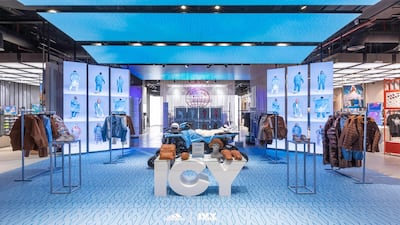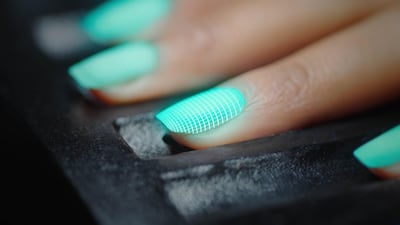Technology has made long strides in the fashion industry; we now live in an age of virtual runway shows and CGI models. It was inevitable that hi-tech gizmos and hacks would trickle down to the level of average consumers, forever altering the way they shop. Leading the charge in the UAE is Adidas.
When the German shoemaker announced the opening of the region’s first flagship store, expectations were justifiably high. However, when the 16,000-square-foot space opened its doors in The Dubai Mall in the middle of March, the results were astonishing. Bristling with technology and putting the customer front and centre in every aspect of the store, it not only looked dazzling, but also revealed a totally new shopping experience.
Backing up the company's commitment to sustainability, the store has been fitted out using enough recycled materials to warrant a gold rating from the international accredited LEED green building certification, while – as the brand’s most connected store – it has state-of-the-art technology including a digital ceiling and even a digitised footwear wall.
Visitors can scan products using a dedicated app to glean information in real time, as well as request a size and colour, that is then delivered to them in-store, thanks to the Bring it to Me feature.
The changing rooms are armed with interactive mirrors that use radio-frequency identification (RFID) to recognise products and offer information, and allow customers to request different sizes and colours with just a few swipes. For those keen to see how a product will look in the real world, augmented reality even offers different backdrops to pose against.
Dotted around the store are more than 60 additional touchscreens for browsing products, while analogue features include a sneaker care hub called Crep Protect, while the MakerLab enables customisation, including adding patches, printing, embroidery and laser engraving.
See before you snip at the Amazon Salon

Adidas is not the only brand that’s employing technology to reshape the way we shop. Online giant Amazon has announced it is testing a new hair salon concept in London. Called Amazon Salon, it will be spread over two floors in a building in Spitalfields, and will be equipped with augmented reality mirrors that allow customers to “try out” different cuts, styles and colours before the stylist reaches for a pair of scissors.
Described by Amazon as an “experiential venue” that will also show off other Amazon innovations, it will be a fully functioning salon, with a full range of hairdressing services including highlights, treatments and braids. Once chosen, the actual procedure will be carried out by professionals from the Neville Hair & Beauty salon in London.
Amazon also recently opened a contactless grocery store accessible to account holders. With a code needed to gain entry, all the goods inside are tracked not by staff, but rather by sensors and cameras that detect when a product is moved. With no check out to pass through, the goods are automatically charged to a user’s Amazon account as soon as they leave the store.
10-minute manicures with Nimble
Beauty mavens also have another service to keep an eye on. This is an idea that’s still in the Kickstarter-funding stage – an American device called Nimble, which integrates artificial intelligence into the previously low-tech world of manicures. Rendered in the form of a small tabletop white box, it promises to give the perfect manicure in just 10 minutes.
A user need simply place his or her hand inside the box and machine vision – powered by AI – will use complex algorithms based on behavioural mechanics to scan the fingertips, and work out the precise size of each. The machine will then automatically apply three coats of polish, as base, colour and top, using the optimal quantity, for an exact fit for the shape, length and size of a person’s nails. The inbuilt dryer will ensure the nail paint does not chip despite being out and about in less than a quarter of an hour.
In what it calls the Clean Polish Promise, Nimble uses only vegan and non-toxic formulations that are sold in glass vials. Each set contains enough varnish for three full applications and, to encourage recycling, customers get a price reduction for every set of empty bottles that are returned.
Burberry launches Social Media Store in China
It’s not just tech companies and enterprising start-ups that are upgrading customer experience, either. An early adopter of technology in retail, heritage British brand Burberry has long been at the forefront of innovation.
In 2009, it launched Art of the Trench, inviting customers to upload images of themselves wearing the classic Burberry trench coat, creating direct dialogue with clients that other brands have rushed to follow. For its spring / summer 2021 show, it partnered with Twitch, becoming the first fashion house to stream its show on the platform.
So, it was no real surprise when for its Shenzen store in China, Burberry teamed up with tech company Tencent to create the world’s first Social Media Store. Divided into 10 interactive zones, the store encourages customers to explore at will, offering unique features that can only be unlocked through the social platform WeChat.
Customers can scan QR codes to learn the story behind each product that, in turn, can be shared online. As an incentive to physically visit the store, customers are rewarded with a form of virtual currency, as well as given a virtual unhatched egg “animal” that grows and evolves with each in-store interaction.
Beauty vending machine by & Other Stories
On the high street, Swedish brand & Other Stories installed a vending machine in the La Coupole building at Galeries Lafayette Paris Haussmann in the summer of 2020.
Complete with an interactive touchscreen, it is stocked with miniature versions of the brand’s best-selling bath and body range, including Perle de Coco, Punk Bouquet, Sicilian Sunrise and Arabesque Wood.
Shoppers can snap up a hand soap for Dh30, mini hand cream for Dh22, roll-on perfume for Dh66 and eau de toilette for Dh130. The machine also works as an interactive hub for the full beauty range, giving information about every product.
Being trialled as a one-off, there are plans to roll out more vending machines across other sites if it proves a success with customers.




